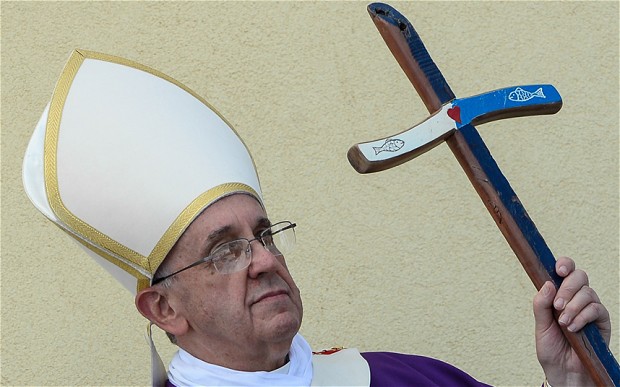Pope Francis Toughens up Vatican Laws on Child Sex Abuse
By Nick Squires
But the measures were dismissed by anti-abuse campaigners as little more than administrative tinkering because they applied only to the tiny city state and would have no impact in protecting children in the rest of the world from predatory priests. The new laws about the sexual abuse of minors came just two days after the United Nations’ Committee on the Rights of the Child demanded that the Vatican divulge documents about its treatment of abuse victims around the world and its leniency towards predatory priests. The new laws represented “a broader definition of the category of crimes against minors, including the sale of children, child prostitution, the recruitment of children, sexual violence and sexual acts with children, and the production and possession of child pornography,” the Vatican said. Those crimes can now be punished with prison sentences of up to 12 years — a slightly heavier penalty than under the previous legal code. The new laws, applicable from Sept 1, will apply only to people working or living in Vatican City. They did not impress former victims of clerical sex abuse. “For the Vatican’s image, this is a successful move. For children’s safety, this is another setback,” said David Clohessy, the director of the US-based Survivors Network of those Abused by Priests or SNAP. “In the real world, this changes virtually nothing. It’s is precisely the kind of ‘feel good’ gesture that Vatican officials have long specialised in: tweaking often-ignored and ineffective internal Church abuse guidelines to generate positive headlines but nothing more. “The Church hierarchy doesn’t need new rules on abuse. It needs to follow long-established secular laws. Church officials, starting with Pope Francis, need to actually punish those who conceal and enable abuse, which they have ample power to do but inadequate courage to do.” Sacking a bishop who had protected one or more abusive priests “would do far more to protect kids and deter cover-ups than this small change to a rule that’s likely never been, and never will be, used”. The Pope also beefed up penalties for any Vatican official caught stealing or leaking official documents, a year after then-Pope Benedict XVI’s butler was arrested, convicted and jailed for taking confidential papers from his offices. Paolo Gabriele leaked the documents, which lifted the lid on allegations of corruption, nepotism and dirty tricks campaigns involving accusations of homosexual affairs, to an Italian journalist who published them in a bestselling book. Benedict was said to have been so devastated by the betrayal that it contributed to his decision to step down, in the first papal resignation since the Middle Ages. Reflecting the gravity with which the Vatican viewed the “Vatileaks” affair, the new penalties are severe. A person who reveals or receives confidential documents can be jailed for six months to two years. If the stolen or leaked material concerns the “fundamental interests” or security of the Holy See, they can be imprisoned for eight years. The Pope, who was elected in March amid strident calls from some cardinals for profound reform at the heart of the Holy See, also boosted cooperation with other countries against money-laundering, as the Vatican struggles to contain a money-laundering scandal involving its own bank, the Institute for Religious Works. The new anti-money-laundering regulations were “a continuation of the efforts to update Vatican City State’s legal system, building upon the measures adopted since 2010 during the pontificate of Benedict XVI,” the Vatican said in a statement. The South American Pope announced the law changes in a decree known as a “motu proprio”. It was signed “Franciscus” and dated “July 11, 2013, the first (year) of my pontificate”.
|
.
Any original material on these pages is copyright © BishopAccountability.org 2004. Reproduce freely with attribution.
